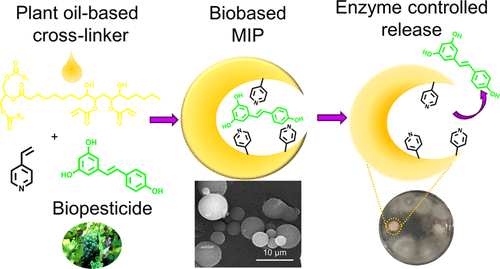当前位置:
X-MOL 学术
›
ACS Sustain. Chem. Eng.
›
论文详情
Our official English website, www.x-mol.net, welcomes your
feedback! (Note: you will need to create a separate account there.)
Renewable Plant Oil-Based Molecularly Imprinted Polymers as Biopesticide Delivery Systems
ACS Sustainable Chemistry & Engineering ( IF 7.1 ) Pub Date : 2020-09-18 , DOI: 10.1021/acssuschemeng.0c05145 Nicolas Le Goff 1 , Isabelle Fomba 1 , Elise Prost 1 , Franck Merlier 1 , Karsten Haupt 1 , Luminita Duma 1 , Antoine Fayeulle 2 , Aude Falcimaigne-Cordin 1
ACS Sustainable Chemistry & Engineering ( IF 7.1 ) Pub Date : 2020-09-18 , DOI: 10.1021/acssuschemeng.0c05145 Nicolas Le Goff 1 , Isabelle Fomba 1 , Elise Prost 1 , Franck Merlier 1 , Karsten Haupt 1 , Luminita Duma 1 , Antoine Fayeulle 2 , Aude Falcimaigne-Cordin 1
Affiliation

|
New bio-based molecularly imprinted polymers (MIPs) were synthesized as biopesticide delivery systems by free radical polymerization using a functional monomer and a vegetable oil-derived cross-linker, epoxidized soybean oil acrylate (ESOA). Resveratrol, a polyphenol with antifungal activity against several phytopathogens, was employed in this study as a model biopesticide. 4-Vinylpyridine (4VP) and 1-vinylimidazole (1VI) were the best functional monomers for resveratrol imprinting, as determined by nuclear magnetic resonance (NMR) interaction studies and batch binding experiments. ESOA-based MIPs showed comparable specificity, high affinity, and selectivity for resveratrol when compared to MIPs prepared with the traditional cross-linker ethylene glycol dimethacrylate (EGDMA). Bio-based MIP particles were also produced by emulsion polymerization, a greener method needing less organic solvent than precipitation polymerization. Bio-based MIPs could release resveratrol in aqueous medium and were sensitive to a fungal lipase from Candida rugosa, suggesting an alteration of the polymeric matrix by this lipase. Resveratrol-loaded MIPs were used as drug delivery systems for the inhibition of the phytopathogen Sclerotinia sclerotiorum in solid and liquid media. MIPs prepared with 4VP and ESOA exhibited high inhibitory effects. This work demonstrates the feasibility of MIPs synthesis with a vegetable oil-derived cross-linker, and the resulting material represents a promising sustainable pest control agent delivery system for crop protection.
中文翻译:

可再生植物油基分子印迹聚合物作为生物农药输送系统
通过使用功能单体和植物油衍生的交联剂,环氧化大豆油丙烯酸酯(ESOA)进行自由基聚合,合成了新的生物基分子印迹聚合物(MIP)作为生物农药传递系统。白藜芦醇,一种对几种植物病原体具有抗真菌活性的多酚,在本研究中用作模型生物农药。通过核磁共振(NMR)相互作用研究和分批结合实验确定,4-乙烯基吡啶(4VP)和1-乙烯基咪唑(1VI)是白藜芦醇印迹的最佳功能单体。与使用传统交联剂乙二醇二甲基丙烯酸酯(EGDMA)制备的MIP相比,基于ESOA的MIP对白藜芦醇显示出可比的特异性,高亲和力和选择性。生物基MIP颗粒也是通过乳液聚合生产的,一种比沉淀聚合所需有机溶剂更少的绿色方法。基于生物的MIP可以在水性介质中释放白藜芦醇,并且对来自皱纹假丝酵母,表明该脂肪酶改变了聚合物基质。负载白藜芦醇的MIP用作药物输送系统,用于抑制固体和液体介质中的植物病原菌核盘菌。用4VP和ESOA制备的MIP表现出很高的抑制作用。这项工作证明了使用植物油衍生的交联剂合成MIP的可行性,并且所得材料代表了一种有前途的可持续害虫控制剂递送系统,可用于作物保护。
更新日期:2020-10-26
中文翻译:

可再生植物油基分子印迹聚合物作为生物农药输送系统
通过使用功能单体和植物油衍生的交联剂,环氧化大豆油丙烯酸酯(ESOA)进行自由基聚合,合成了新的生物基分子印迹聚合物(MIP)作为生物农药传递系统。白藜芦醇,一种对几种植物病原体具有抗真菌活性的多酚,在本研究中用作模型生物农药。通过核磁共振(NMR)相互作用研究和分批结合实验确定,4-乙烯基吡啶(4VP)和1-乙烯基咪唑(1VI)是白藜芦醇印迹的最佳功能单体。与使用传统交联剂乙二醇二甲基丙烯酸酯(EGDMA)制备的MIP相比,基于ESOA的MIP对白藜芦醇显示出可比的特异性,高亲和力和选择性。生物基MIP颗粒也是通过乳液聚合生产的,一种比沉淀聚合所需有机溶剂更少的绿色方法。基于生物的MIP可以在水性介质中释放白藜芦醇,并且对来自皱纹假丝酵母,表明该脂肪酶改变了聚合物基质。负载白藜芦醇的MIP用作药物输送系统,用于抑制固体和液体介质中的植物病原菌核盘菌。用4VP和ESOA制备的MIP表现出很高的抑制作用。这项工作证明了使用植物油衍生的交联剂合成MIP的可行性,并且所得材料代表了一种有前途的可持续害虫控制剂递送系统,可用于作物保护。










































 京公网安备 11010802027423号
京公网安备 11010802027423号